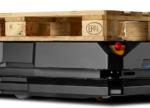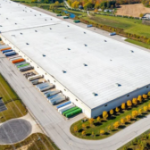With over 1,100 projects in 150 locations in over 40 countries and 10,000 staff, service company Ecolog International’s imprint is now writ large in the world of urgent response logistics as it celebrates its 20th anniversary. It is well-established across Middle East and the African continent, with support to the Mining, Oil and Gas sectors all prominent. Government projects include a global contract with the UK MoD to supply overseas deployable food. It played a prominent role in shaping the European testing and vaccine rollout during the Covid pandemic. This impressive haul was all founded by a German entrepreneur Nazif Destani, private equity portfolio owner, now including ambitious expansions into sustainability and environmental projects. The mission? ‘Care for People, Planet, Future.’ That’s ambition.
CEO Andy Vargoczky, an Australian national, who has been in post since the beginning of the year, has spent over 30 years in logistics, working with airlines in freight and for 3PLs, and to date has lived in 13 countries – but that’s a story for another day.
“Well, it certainly prepares you for a rapidly changing environment,” he laughs. For speed and agility – to the power of 100 – are Ecolog’s watchwords.
“We are project-based, with a very agile mindset,” he explains. “We need to be super-fearless, because we have partnerships and support systems in various geographies, as part of our 24/7 ability to respond very quickly. Our whole ecosystem and DNA are built on this urgent response capability.”
Such a mindset, working in remote, unhospitable and sometimes downright dangerous locations, requires special people, he goes on. “Our workforce, which hails from 56 countries, has multiple layers. There is our permanent workforce but also non-permanent colleagues whom we know well we can call upon, then agencies around the world who can also supply us with manpower. It means we can scale up from a few people to a few thousand in a week if we have to. Not many organisations can come up with timeframes like that, and it means we don’t have many competitors because it’s not easy. The challenge itself drives the right behaviours, the right mentalities.”
He says there is a subtle difference in Ecolog’s approach to those of a ‘typical’ logistics operator. “Logistics companies measure their performances in transactions, numbers of containers they move or shipments they make; it’s all about scale. That’s not our model. We’re project-based and it’s all about speed-to-market to make sure our client base is supported adequately. We’re in the support business. We enable our clients to focus on their operations by taking care of their daily needs, that’s our core, going to remote or challenging areas and knowing how to mobilise for them.”
He is a huge admirer of the logistics mentality. “Logistics is in our DNA. Let’s not forget, it took the pandemic for the world to realise that logisticians are exceptional problem solvers.”
Ecolog took a proactive role early in the pandemic. “We work in SOS activities and we used that mindset,” he recalls. “We approached governments ourselves with solutions, starting with Luxembourg, then Belgium and Netherlands, some work for the NHS in the UK and our largest footprint is in Germany with over 500 testing and vaccine locations, many in collaboration with one of the world’s largest supermarket chain companies.”
Over the years, Ecolog has become one of the leading names in food logistics providers, especially in supporting humanitarian and governmental organizations. The company has been delivering food to the UN peacekeeping missions in Africa as of 2015, supplying food and catering for the oversees programmes of the UK Ministry of Defence for the last five years, and is now delivering over 120 trucks of food to Ukraine weekly, while operating a massive warehouse on the Polish-Ukrainian border.
Future plans cohere strongly around the themes and challenges created by climate change. Water purification and desalination projects are on the increase, as are plans to create renewable energy infrastructures.
The post The urgent response business appeared first on Logistics Business® Magazine.


